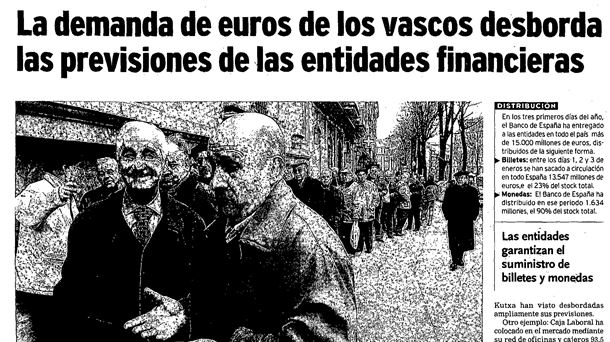On the 20th anniversary of the entry of the euro, we look back and analyze the current landscape with the help of an economist.
This January 1, 2022 Twenty years have passed since we left the peseta behind to fully introduce the euro in our lives. Two decades go a long way, although there are those who still think in pesetas. But how has the euro changed our lives? Are we already facing a society completely accustomed to the European currency?
A end of last June In 2021, according to the estimate of the Bank of Spain, 55% of the pesetas that were in circulation before the entry of the euro had been exchanged since 2002. Once the exchange period had expired, the remaining 45% would have remained in the hands of the public as a souvenir or collector’s item, damaged, lost or left the country in the pockets of tourists.
Gorka Macias is economist And he believes that this change that has been accompanying us for twenty years has affected different generations in different ways. The Spanish State, he explains, “is characterized by having a society in which the average age is quite high“, so many people” were used to the peseta. “He points out that,” when you talk to them about large amounts, such as the sale of flats and cars or annual salaries, “they still need to translate it into pesetas to assess whether it is a large or small amount.
Remember, on the other hand, that people under 30 have lived a very different economic reality, and he illustrates this with a personal anecdote: “at the ikastola I received the math book with the pesetas on the last pages to learn them, but in the middle of the year they changed the book for us “. It is, therefore, one of those cases of a generation that did not live and consume peseta in hand. “I think in euros.”

News published by the newspaper El Correo on January 5, 2002. Photo: EITB Media
Memories of a close past
“As the peseta is linked to the past and the euro to the future, it is often repeated that, in the past, with a million pesetas you could do much more than with 6000 euros today.” But “the prices of now”, points out the economist, “are not the prices of when the euro entered.” Notes that “The standard of living has risen, but wages did not rise to that level, because the economy was not prepared. “
In the case of the Spanish State, he speaks of a “worse” economic structure as a starting point, “since we came from the Franco regime, so that structure was formed in dependence on the other countries.” A dependency that, he adds, can sometimes cause a country to remain “behind the powers that govern its currency.”
Europeanization and development
The president of Banco Central Europea (ECB), Christine Lagarde, stated in an article published this Friday in several European newspapers that the euro has “strengthened” Europeans in the face of crises, also that of the coronavirus pandemic.
Lagarde believes that “in critical moments, such as the pandemic, the single currency has been essential for coordinate the different responses in EuropeThe president of the ECB has also maintained that “the euro has contributed to the feeling of unity among Europeans”, as the euro and Europe “are now inseparable”.
In addition, he has argued that, “for young Europeans, who have always known only the single currency, it must be practically impossible to imagine Europe without the euro.”
Along these lines, one of the aspects in which Macías affects when referring to the currency exchange is that Spain has become a “more Europeanized country; at the level of labor rights, green resources or lifestyle“.
Although he does not dare to lean towards the positive or negative of this change, the economist emphasizes that all political decisions “have their good part and their bad part, and it is difficult to evaluate the impact that they will have in the future.” Among the benefits of the establishment of the euro, he mentions “the power establish structural rather than monetary policies, to avoid putting a patch today but tomorrow the same problem will appear. “On the other hand, and focusing on the possible disadvantages, it refers to the fact that” it has brought more centralized control from the European Union“.
Macías wonders what would have happened if Spain had not entered the euro or the European Union. Although he confesses not knowing for sure, “we can deduce that he would have had a slower economic development process.”
Ricardo is a renowned author and journalist, known for his exceptional writing on top-news stories. He currently works as a writer at the 247 News Agency, where he is known for his ability to deliver breaking news and insightful analysis on the most pressing issues of the day.












